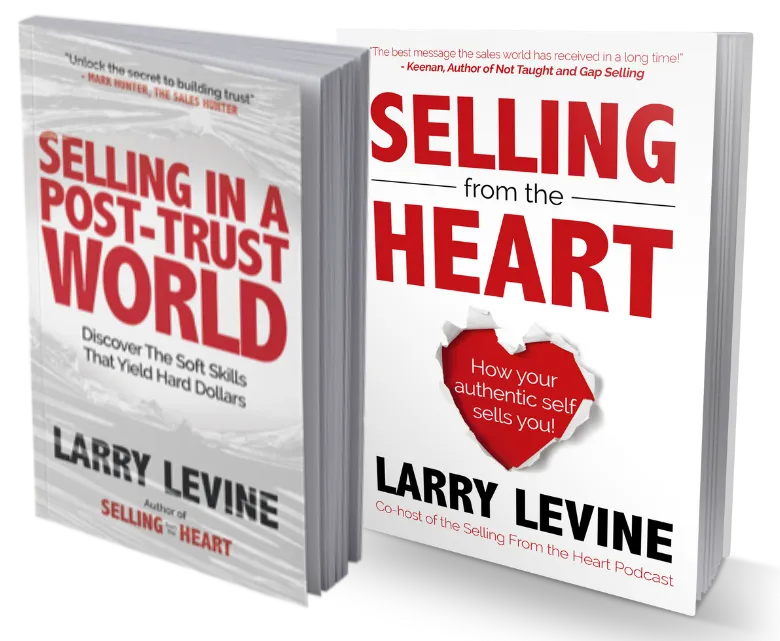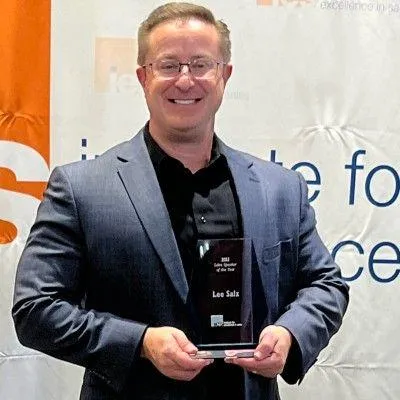FREE RESOURCES
More Trust,
More Sales!







The Trust Formula
Our training centers on building trust with prospects and clients.


Unlock Sales Success: The CEO's Complete Guide to Discipline and Coaching.
"A good coach will make his players see what they can be rather than what they are."
Ara Parseghian
This quote really gets to the heart of what great coaching is all about. And this is why we're going to use this quote to set the stage for our time together.
We all know professional athletes lean into their coaches to help them become better.
So, why on earth is this such a struggle inside the sales world?
My beliefs...
Good coaching doesn't just deal with the present reality of a salesperson's skills and abilities. It's about possessing the vision to see what that salesperson could become with the right guidance, training, and mindset.
Good coaching is about inspiration combined with motivation. It's about showing salespeople their potential. It's about inspiring them to work harder and push beyond their perceived limitations. It's about igniting a belief in themselves that they might not have had before.
Good coaching is about encouraging a growth mindset. It's about instilling in salespeople to flip the switch on their mindset, encouraging them to embrace challenges and learn from setbacks.
Good coaching goes way beyond the current skill level of salespeople. It's about fostering personal growth, building confidence, and helping salespeople unlock their full potential, even if it seems out of reach initially.
Good coaching is transformational. A truly effective coach can help salespeople not only improve their skills but also develop into better individuals, both in their professional and personal lives.
In our time together this week, my message is simple, clear and aimed at CEOs... If you want to radically grow your revenues and profits, then become massively disciplined around constant and consistent coaching of your salespeople, the revenue and profit generating arm of your company.
The Journey Begins Now...
This we do know, today’s business world is hyper-competitive. We must come to grips that we live in a post-trust world. Those CEOs who lead high-growth companies understand one fundamental truth, sales success is not about occasional brilliance; it’s about consistent discipline and ongoing coaching.
Salespeople, like elite athletes, need structure, accountability, and continuous development to perform at their peak. No excuses, no finger pointing, no exceptions... This applies to all salespeople, even the ones clicking on all cylinders.
All too often, company's hire salespeople and expect results without investing in the systems, culture, and leadership that cultivate long-term success.
Success isn’t always about greatness. It’s about consistency. Consistent work leads to success.
This truth is especially relevant in sales, where daily habits, skill development, and coaching create sustainable revenue growth.
For CEOs, the challenge isn’t just hiring the right salespeople, it’s building a culture of discipline and development.
Together, we're going to explore why discipline and coaching are critical for sales success and how CEOs can foster a high-performance sales environment.
The Role of Discipline in Sales Performance
“Small disciplines repeated with consistency everyday lead to great achievements gained slowly over time.”
John C. Maxwell
The Power of Daily, Disciplined Habits
High-performing sales teams don’t rely on motivation alone; they depend on disciplined habits. The best salespeople follow a structured approach to prospecting, client management, and strategics follow-ups.
As Pastor Graig Groeschel emphasizes,
“It’s not what you do occasionally that matters, it’s what you do consistently.”
Without discipline, sales teams experience unpredictable pipelines, bursting with opportunities one month and barren the next.
CEOs must instill a culture of daily sales activity that is non-negotiable at levels, ensuring that every salesperson (and yes, your topflight people) has a playbook for:
Prospecting daily, not just when the pipeline is dry.
Following up systematically, not sporadically.
Maintaining a structured sales process to prevent wasted opportunities.
CEOs with a coaching philosophy help their teams avoid the feast-or-famine cycles that kill revenue momentum.
The Trust Formula: Why Disciplined Coaching Matters
Trust is the foundation of every successful sale. However, trust is not built through one-time actions, it is earned through consistent behavior.
In Selling in a Post-Trust World, I bring to life the Trust Formula that includes four key components:
Authentic Relationships – Showing up with sincerity and empathy
Meaningful Value – Providing insights, education and solutions that matter
Inspirational Experience – Creating memorable interactions every time
Disciplined Habits – Following through on commitments
Discipline is the glue that binds these components together. Without disciplined habits, authenticity feels hollow, and value goes unnoticed.
As a CEO, you must ensure that discipline is a core part of your sales team’s DNA. When sales professionals consistently deliver on their promises, show up for their clients, and engage in proactive outreach, they build unshakable trust.
CEOs who drive a culture of discipline and provide continuous coaching for their sales teams create organizations that win month in and month out, quarter after quarter, and year after year.
Why Consistent Coaching Matters More Than Ever
Unfortunately, and something that concerns me is that many CEOs assume that once salespeople are trained, they can be left to their own devices. This is one ginormous mistake.
Discipline and consistent coaching are the key differentiator between average and elite sales teams.
1. Sales Is a Profession, Not a One-Time Training Event
Imagine a professional sports team that practiced once a year. Sounds ridiculous, right? Yet, many sales teams operate under this flawed model, attending a single training event and expecting long-term sustainable results.
All you have to do is reflect upon some of the past attended annual sales kick-offs, need I say more?
To quote my dear friend Mike Weinberg, as he warns,
“Too many sales organizations operate under the myth that experience alone equals excellence. In reality, the best salespeople and teams engage in constant training and refinement.”
Coaching must be a continuous process including:
Regular one-on-one coaching sessions focused on skill development
Real-time feedback after sales calls and meetings
Group role-playing exercises to refine what they experience out in the field
Data-driven performance analysis to identify areas of improvement
2. Accountability, The Backbone of Coaching
CEOs, executives and sales leaders often hesitate to hold their teams accountable, fearing it will damage morale. When this happens, you allow salespeople to run the asylum.
True coaching is impossible without accountability.
My dear friend and podcast partner Darrell Amy, author of Revenue Growth Engine, emphasizes that “if you’re not growing, you’re not going anywhere.”
Growth comes from setting clear expectations and ensuring they are met.
To build a culture of accountability (this applies to all salespeople, even the chosen one's):
Set measurable sales KPIs and Revenue Generating Activities (prospecting activity, meetings booked, deals advanced, deals closed)
Conduct weekly performance reviews to track progress
Celebrate incremental wins and small improvements, not just closed deals
Provide constructive feedback rather than micromanagement
3. Coaching Beyond the Numbers, Mindset and Emotions
Success starts from within. It's being genuine, self-aware, and leading with heart.
Elite salespeople and teams don’t just execute strategies, they manage their emotions, stay resilient, and build deep connections.
Successful sales professionals overcome setbacks by staying aligned with their purpose and focusing on the value they bring to their clients.
Great coaching goes beyond numbers and helps salespeople master their mindset:
How do they handle rejection?
How do they build trust in skeptical buyers?
How do they stay motivated in slow months?
By coaching to the emotional side as well as the mindset side, CEOs ensure their teams thrive in any market condition.
Check out the Culture from the Heart Podcast, culturefromtheheart.com
Practical Steps for CEOs to Implement Discipline and Coaching
"One of the most important actions, things a leader can do, is to lead by example. If you want everyone else to be passionate, committed, dedicated, and motivated, you go first."
Marshall Goldsmith
1. Lead by Example
The most successful sales cultures are built from the top down. If you, as the CEO, lack discipline or fail to prioritize coaching, your team will follow suit.
You must model the behavior you expect:
Be present in sales meetings and coaching reviews.
Celebrate discipline by acknowledging consistent prospecting, not just closed deals.
Demonstrate commitment by engaging directly with your clients and future clients.
2. Build a Structured Coaching Cadence
Structure is critical for both discipline and coaching. Implement a consistent coaching routine that becomes part of your company’s internal operating system:
Consistent weekly one-on-ones with sales leaders and to review team performance and activity.
Consistent monthly pipeline review deals in progress, and to coach on sales strategies.
Consistent quarterly sales leadership workshops focusing on critical capabilities such as discovery calls, business conversations, or having difficult conversations.
Consistent peer-learning sessions where salespeople share real-world experiences and best practices.
3. Reward Discipline, Not Just Results
A common mistake is to celebrate only closed deals.
Discipline drives deal velocity, and CEOs must reward the habits that lead to success.
Celebrate, acknowledge and call out:
Consistent daily prospecting activity such as most new meetings set, most revenue generating activities
Strategic follow-through and client retention efforts such as post-sale check-ins and client growth.
Commitment to self-improvement such as consistent participation in coaching sessions.
4. Equip Your Sales Leaders to Be Great Coaches
Promoting the best salespeople to sales managers without providing the tools to coach effectively is a sure-fire recipe for disaster.
Invest in leadership development programs that teach sales leaders how to:
Provide constructive, actionable feedback that gets results.
Conduct effective coaching sessions.
Develop both the mindset, skillset and heartset of their team members.
Hold their teams accountable while maintaining positive morale.
Great CEOs coach their sales leaders to hold their entire team accountable.
Great CEOs coach their sales leaders to avoid selective accountability. By this I mean, allowing the top echelon on the sales team to do what they do. Just because the results are there, doesn't mean you leave them alone.
Great CEOs align to hearts and minds of their sales leaders, so their sales leaders connect to the hearts and minds of their salespeople.
The CEO’s Commitment to Sales Excellence
The legendary coach Lou Holtz, brings our time together to a close,
"Winners embrace hard work. They love the discipline of it, the trade-off they're making to win. Losers, on the other hand, see it as punishment. And that's the difference."
Discipline and coaching, this is not optional, it's essential for building a high-performance sales team.
CEOs who foster a culture of disciplined habits and consistent coaching:
Drive predictable, sustainable revenue and profitable growth
Create resilient, client-centric sales teams
Build a reputation in the marketplace for authenticity and trust
When you build trust and show up authentically, sales results will follow.
Here's the question I have for every CEO: Are you leading a sales organization that prioritizes discipline and coaching, or are you leaving success to chance?
If you’re ready, then say out loud, I am ready... I can't hear you, say it louder.
Establish consistent disciplined habits inside your sales team.
Build a consistent non-negotiable coaching cadence.
Recognize and reward behaviors that drive results.
The future of your company’s revenue and profit growth depends on the discipline and coaching culture you build today.
Originally published on Larry Levine's LinkedIn.

Get The Book That Started a Movement in the Insurance Industry
When Selling From the Heart released in 2018 it struck a chord in the insurance profession.
Executives, sales leaders, and sales professionals across multiple industries recognized that the biggest obstacle to growth was the ability to build and sustain trust. Larry Levine's book is a cry for authenticity. Buyers can smell insincerity. In the book, Larry shares his practical framework to bring authenticity and substance to prospects and customers.

"This book isn't one of those fluffy sales books that you read and have no way to act on. Selling from the Heart captures what it truly means to be successful in sales. It's not about the commission check, but rather helping people achieve their goals whatever they may be. I don't normally read for enjoyment, but I could not put this book down."
Lee Salz
Author, Sell Different



